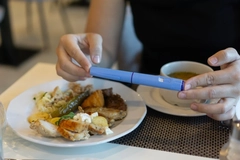
- Industry news
Industry news
- Category news
Category news
- Reports
- Key trends
- Multimedia
- Journal
- Events
- Suppliers
- Home
- Industry news
Industry news
- Category news
Category news
- Reports
- Key trends
- Multimedia
- Events
- Suppliers
Barry Callebaut Confirms Strong Growth in Demand for Certified Cocoa and Chocolate

With over 17 years of experience in certified cocoa and chocolate, Barry Callebaut began with certification programs long before present-day interest appeared and is now a leading global supplier of certified products for the food industry.

29 Jan 2010 --- Barry Callebaut, the world’s leading manufacturer of high-quality cocoa and chocolate products, confirms a marked increase in the demand for certified cocoa and chocolate products. Strong consumer demand for ‘responsibly produced chocolate’ lies at the basis of this growth. Barry Callebaut welcomes this evolution, given its long-standing commitment to developing a more sustainable cocoa sector, beginning with local growers. The Group expects that the sale of certified products will continue to grow significantly in 2010.
With over 17 years of experience in certified cocoa and chocolate, Barry Callebaut began with certification programs long before present-day interest appeared and is now a leading global supplier of certified products for the food industry. Because of its extensive presence in origin countries, Barry Callebaut sources and supplies more than 100 product references of certified chocolates and cocoa powder and has projects with all of the main certification programs. These programs include developments for Fairtrade, Organic / Fairtrade, UTZ certified and Rainforest Alliance Certified products. The group further offers “Fair for Life” certified products through its subsidiary Biolands.
To further the interests of both quality and sustainability, Barry Callebaut launched its own Quality Partner Program in Côte d’Ivoire in 2005. Including some 47 cooperatives and over 42,000 cocoa farmers, Barry Callebaut’s Quality Partner Program reinforces its direct sourcing initiatives while guaranteeing better quality produce and a better life for farmers and their communities.
Hans Vriens, Chief Innovation Officer at Barry Callebaut: “While demand for organic certified chocolate has been growing steadily over the past ten years, we have seen a jump of more than 50% in the demand for fairtrade certified products in 2009 and an increase of 12% in certified products volume overall. These growth rates are significantly ahead of chocolate market growth rates. We are now complementing our offering with UTZ certified and Rainforest Alliance Certified products. This means that we will have products available that meet the standards of some or more of the most widely recognized sustainability labels in the world.”
Juergen B. Steinemann, CEO Barry Callebaut: “Everything at Barry Callebaut revolves around cocoa. It is a rich yet fragile crop grown in a narrow strip around the equator. It is mainly cultivated by small farm holders and their families in some of the poorest areas of the world. Focusing on sustainability is more than a mere optional extra for us; it is an imperative. In order to meet the rising demand for cocoa and chocolate, we must contribute to ensuring that cocoa is grown in a sustainable manner; one that generates income for farmers while also safeguarding the environment. We have been actively engaged for many years in programs which foster sustainable agricultural practices while also providing commercial and logistical support for cocoa farmers. The aim is to secure both the income of small cocoa farmers and the natural balance of the surrounding environment.”
Meanwhile President of the World Bank, Robert Zoellick, is visiting the Nestlé Research and Development Centre in Abidjan for an insight on Nestlé's commitment to sustainability in cocoa.
Mr Zoellick observed the activities of cocoa nurseries and took part in a discussion with farmers at the Centre, accompanied by Klaus Zimmermann, Senior Vice President of Nestlé R&D, and Serigne Diop, Head of Nestlé R&D Centre, Abidjan.
The Centre, which was inaugurated nine months ago, focuses on improving the quality of locally-sourced raw materials, including cocoa, coffee and cassava. In addressing the problem of disease and ageing plantations affecting the West African cocoa harvest, Nestlé has transferred its propagation technology to the site in Abidjan from its R&D Centre in Tours, France.
Mr Zimmermann said: "Starting from 2012, Nestlé will distribute one million high-yield cocoa plants each year in Côte d'Ivoire, thanks to our collaboration with our local partners. The first 100,000 plants have already reached the nurseries of certain cooperatives."
These plant science activities are part of the CHF 110 million group-wide initiative The Cocoa Plan, which was launched last October.
The plan is an important and significant part of broad, collaborative efforts to improve the cocoa supply chain and the lives of cocoa farmers and communities.
This includes improving the quantity and quality of yields by providing 12 million stronger productive plantlets to farmers over the next ten years and teaching farmers more efficient farming methods.










